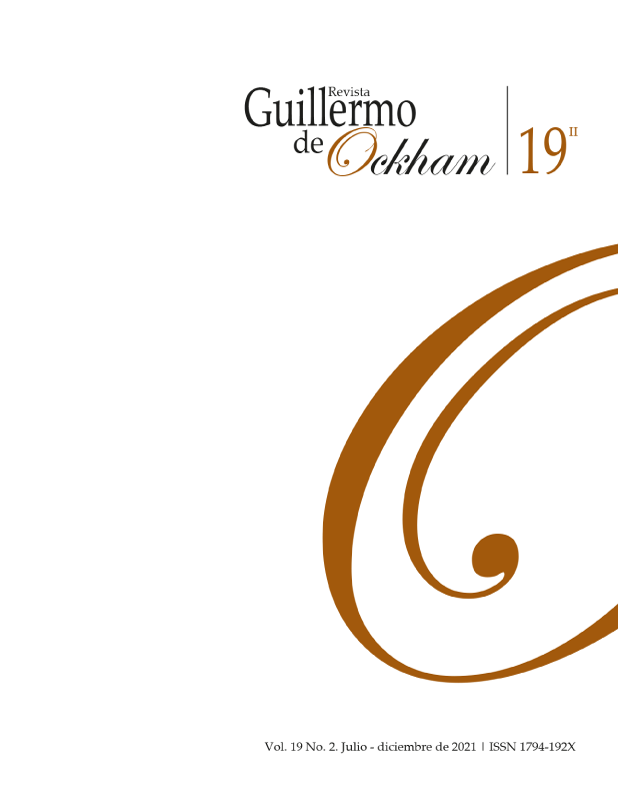The Revista Guillermo de Ockham provides an immediate and open access to its content, based on the principle of offering the public a free access to investigations to provide a global interchange of knowledge.
Unless otherwise established, the contents of this journal has a license with Creative Commons Attribution-NonCommercial-NoDerivatives 4.0 International (CC BY-NC-ND 4.0) http://creativecommons.org/licenses/by-nc-nd/4.0/
- Attribution: You must give appropriate credit, provide a link to the license, and indicate if changes were made. You may do so in any reasonable manner, but not in any way that suggests the licensor endorses you or your use.
- NonCommercial: You may not use the material for commercial purposes.
- NoDerivatives: If you remix, transform, or build upon the material, you may not distribute the modified material.
- No additional restrictions: You may not apply legal terms or technological measures that legally restrict others from doing anything the license permits.
Resumo
Este artículo se propone precisar de qué manera es posible hablar de un lenguaje propiamente literario que contribuye a la resolución de problemas que se plantean en el orden de la acción humana. Para ello, se examina la objeción que Habermas presenta a la idea de una racionalidad práctica contenida en la literatura y al final se exponen los modos posibles cómo la "ficción" logra configurar de una manera singular lo que solemos llamar "realidad".
Referências
Deleuze, G., y Guattari, F. (2001) ¿Qué es filosofía? Barcelona: Anagrama.
Frege, G. (1984). Ensayos de semántica y filosofía de la lógica. Valdés V. L. (Trad.). España. Tecnos.
Guadarrama, P. (septiembre, 2017). La responsabilidad epistémica y ética en la filosofía y la literatura. En: Hybris, 8, 81-108. doi: 10.5281/zenodo.998072
Habermas, J. (2017). El discurso filosófico de la modernidad. Buenos Aires: Katz
Nussbaum, M. C. (2005). El conocimiento del amor. Ensayos sobre filosofía y literatura (Rocío Orsi Portalo y Juana María Inajeros Ortíz, trads.) Madrid: Mínimo Tránsito
Pérez Otero, M. (2009). El estatus ontológico de los mundos posibles. En: Crítica, 41(122), 69-96. doi: 10.2307/3540876
Russell, B. (1919). Descripciones. En: L. Valdés (Ed.). (1991) La búsqueda del significado. Madrid: Tecnos.
Santamaría Velasco, F. (2016). Hacer mundos: el nombrar y la significatividad. Bogotá: Siglo del Hombre Editores.
Searle, J. (1980). Actos de habla. Ensayo de filosofía del lenguaje. Trad. J. Fillol y E. Ujaldón. En: Valdés Villanueva. L. M. (Ed.) (1991). La búsqueda del significado, pp. 83-93. Madrid: Ed.Tecnos.
Serna Arango, J. (2004). Filosofía y literatura: sendas entrecruzadas. En: Areté, 16(1), 81-99. Recuperado de http://revistas.pucp.edu.pe/index.php/arete/article/view/547/537
Valdés Villanueva. L. M. (Ed.) (1991). La búsqueda del significado. Madrid: Ed. Tecnos.
Vásquez Rocca, A. (2006). El giro estético de la epistemología. La ficción como conocimiento, subjetividad y texto. En: Aisthesis, 40, 45-61. Recuperado de http://www.redalyc.org/articulo.oa?id=163221399003
Williamson, T. (1998). Bare Possibilia. En: Erkenntnis, vol. 48, pp. 257-273.

 Perfil Google Scholar
Perfil Google Scholar






























